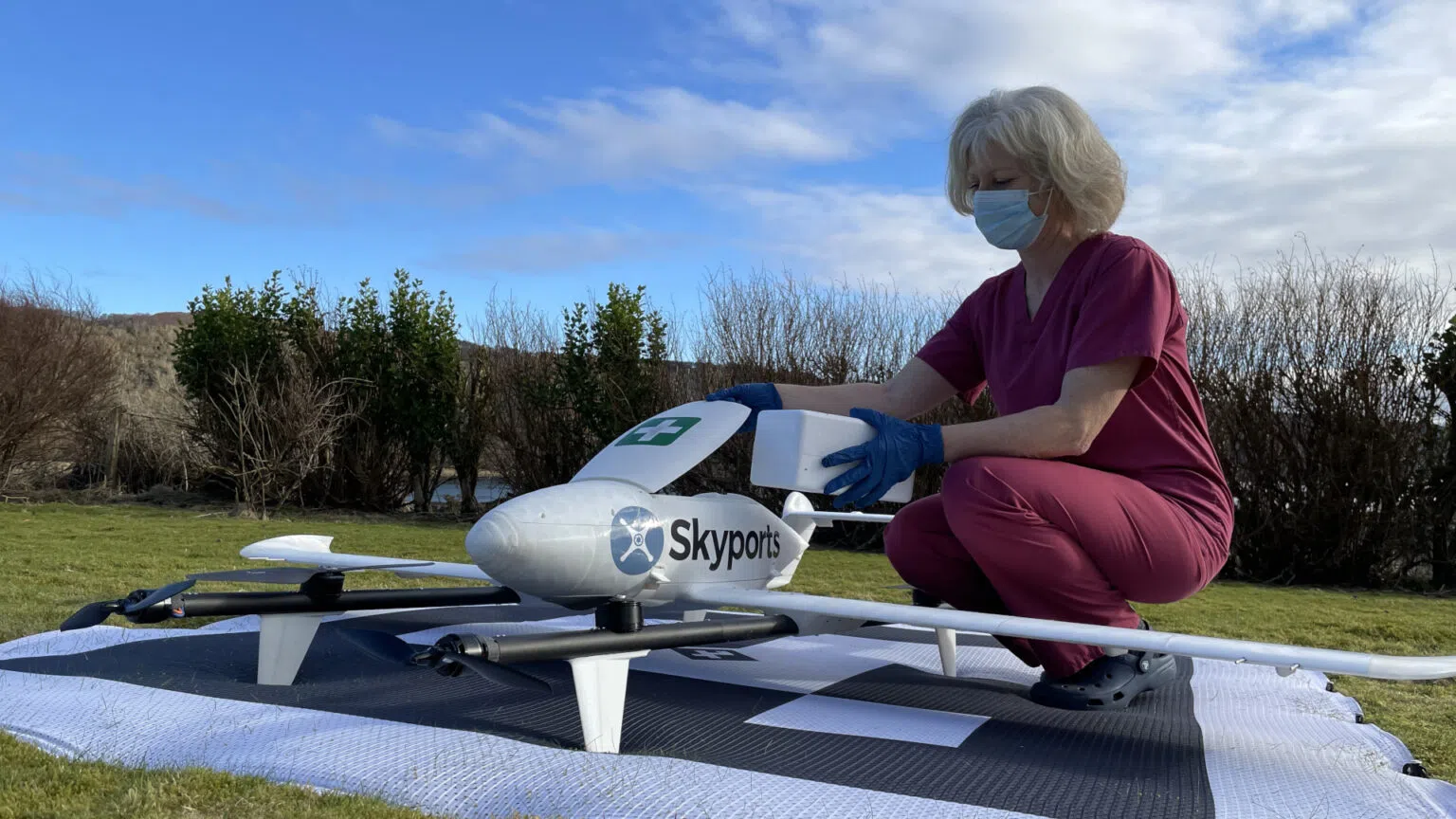Can drones be the aspirin for pharma supply chain headaches?
SOURCE: FREIGHTWAVES.COM
MAR 21, 2022

Since the start of the COVID-19 pandemic, health care workers have been under siege. Supply chain disruptions have limited access to everything from personal protective equipment to vaccines for both COVID-related illnesses and familiar diseases like the flu, at a time when the globe needs them most.
Seeing those disruptions, a trio of companies — Melbourne, Australia-based Swoop Aero, London’s Skyports and Kelberg, Germany-headquartered BD Rowa — are joining forces to open up an air-based avenue for medical and pharmaceutical deliveries. The three companies announced Monday that they would combine air logistics expertise with health care-oriented technology to add a network of delivery drones to global health supply chains.
Swoop Aero and Skyports, two global leaders in drone technology, will integrate their solutions into BD Rowa’s infrastructure of automated technology for the health care and pharmaceutical industries, which includes robots that can automatically pick and dispense medications. The company also recently added a last-mile delivery network.
“We were impressed with Swoop Aero’s technology and the impact they and Skyports were having deploying it in global markets in conjunction with major players in the health care industry. It was clear early on that we shared common ground,” said Mario Ulrich, global industry leader of pharmaceutical distribution centers for BD Rowa.
The technology from Swoop Aero with which Ulrich is so enamored includes self-piloting drones that specialize in contactless deliveries for pathology, pharmaceuticals, vaccines and urgent blood. The aircraft are supported by a tech-based infrastructure that enables real-time location tracking and temperature monitoring for cold chain networks.
“There are so many touch points along the journey pharmaceutical products take from the point of manufacture to the point of patient care. Deploying technology at any one of these provides opportunities to improve health care system outcomes,” said Swoop Aero CEO and co-founder Eric Peck. “By seamlessly integrating sustainable air logistics to deliver medical supplies, we have already seen significant improvements to access to medicine through our operations.”
Swoop Aero’s solution is particularly useful for accessing remote or hard-to-reach communities. The company’s technology maps earthquakes, floods, wildfires and volcanic eruptions and provides live video monitoring feeds to assess safe landing areas and aid in search and rescue efforts. The drones can also be integrated into a company’s existing logistics network and are even able to fly to and from ships at anchor, connecting land- and sea-based operations.
Skyports, in contrast, is more focused on building the infrastructure that supports drone flights. Leveraging Swoop Aero’s technology in partnership with the U.K.’s National Health Service and Royal Mail, as well as with FedEx (NYSE: FDX) in Ireland, Skyports builds and operates landing sites for drones, which it calls vertiports. The sites resemble miniature airports, but they are designed to be accessible to all vehicle types.
Currently, Skyports operates three vertiports. Its main location in London services Europe and the Middle East, while its Singapore site covers the Asia-Pacific region and its Los Angeles location reaches customers in the Americas. Alex Brown, Skyports’ director of drone services, sees the company’s vertiports as one of the keys to unlocking the global health supply chain.
“We already know the power that drone logistics can bring to health care settings from our work with the NHS in the U.K., transporting pathology samples and COVID-19 tests,” Brown remarked. “In just the U.K. to date, we have saved over 12,000 hours of patient waiting time, meaning that patients can start treatment sooner and get on with their lives.
“With this partnership with BD Rowa,” he added, “we’re bringing drone delivery to the pharmaceutical sector to provide speed, frequency and reliability to patients located in hard-to-reach communities across the U.K., Europe and the Middle East.”
Skyports, like Swoop Aero, has its own fleet of delivery drones that can deliver medical supplies to hard-to-reach places. The company offers two kinds of deliveries — maritime-focused deliveries, including ship to shore, and rural-focused deliveries that are cheaper and faster than a typical ground-based delivery network.
Drones in the health care system aren’t new, but they’re still in a nascent stage. Drone delivery provider Zipline is often viewed as a leader in the space, having started humanitarian drone missions as early as 2016 in Rwanda, where it delivered supplies like medicines and blood.
LATEST NEWS
WHAT'S TRENDING


Data Science
5 Imaginative Data Science Projects That Can Make Your Portfolio Stand Out
OCT 05, 2022

Coventry University expert explains what Amazon drone deliveries means for jobs and the price of a package
SOURCE: HTTPS://WWW.COVENTRYTELEGRAPH.NET/
NOV 02, 2023
This New Autonomous Drone for Cops Can Track You in the Dark
SOURCE: HTTPS://WWW.WIRED.COM/
SEP 26, 2023
Tamil Nadu government approves farm mechanisation subsidy for Garuda Aerospace drones
SOURCE: HTTPS://AGRICULTUREPOST.COM/
SEP 25, 2023
The Future Of Biomedical Transport: Drones At The Service Of Health
SOURCE: HTTPS://WWW.EMERGENCY-LIVE.COM/
AUG 25, 2023
Groundbreaking Drone Flights with Radiation Detection Pave the Way for Improved Safety on Nuclear Sites
SOURCE: HTTPS://DRONELIFE.COM/
AUG 11, 2023
Drone with sticky patches studies biodiversity by bumping into trees
SOURCE: HTTPS://WWW.NEWSCIENTIST.COM/
JUL 13, 2023




